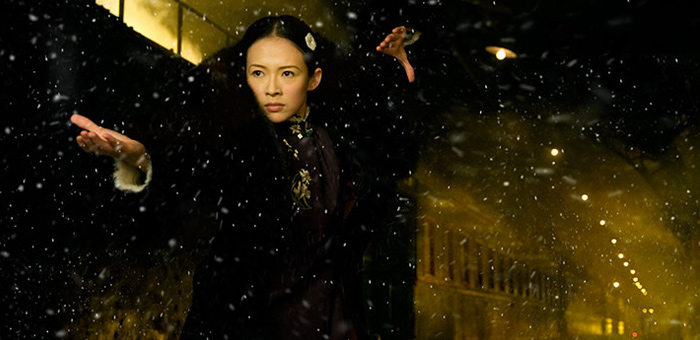Vertical Flow: Style Vs. Substance Vs. Wong Kar Wai
In 1936 Foshan, located in Southern China, legendary Ip Man (Tony Leung) resides with his wife, Zhang Yongcheng (Song Hye Kyo), herself the descendent of Manchu nobility. Ip man, known for his mastery of the Wing Chun school of kung fu, regularly frequents the Gold Pavilion, an elegant brothel, about to be the venue for the retirement of Grandmaster Gong Baosen (Wang Qingxiang) who hails from the northeastern provinces known as Manchuria, a region recently visited by political turmoil with the invasion of Japanese forces. While the grandmaster had recently been treated to a ceremony in his native region, the Southern masters have invited him to their province for a ceremony, meaning a challenge and displays of martial arts kills with a younger man must take place. Gong’s egotistical disciple, Ma San (Zhang Jin) performed this challenge at the previous ceremony, and now Ip Man will have to prove his qualifications for the challenge. Also in attendance is Gong’s daughter, Gong Er (Ziyi Zhang), the sole inheritor of her father’s lethal Bagua style 64 Hands technique. Her meeting with Ip Man will prove important for both of them, though the approaching war drives them to 1950s Hong Kong, where Ip man finds himself separated from his family and Gong Er must reclaim her family’s honor from Ma Sun.
While Wong’s original cut was somewhere in the vicinity of four hours, the North American release sees the title edited down to 108 minutes, and one wonders if some detrimental character developments were left in the rubble. The theatrical release is stodgily stuffed with historical exposition, large chunks of time explained away by blocky sentences as we purportedly skip over all that humdrum day to day stuff to land squarely in the middle of major life events or anticipated confrontations. To be fair, these bring us to a handful of expertly choreographed sequences and a production design that is utterly flawless. Unfortunately, set betwixt a muddled flurry of historical glossing, they are too few and far between, and we come away with learning more about the differing styles of martial arts than we do anything else.
While the first half of the film belongs entirely to Tony Leung, Ziyi Zhang steals the show in the second half, taking home the most memorable sequence in her showdown with Ma San as she avenges her father’s death. It’s one of those momentous show-stopping sequences, turning the flaccid energy of The Grandmaster into top gear before it crash lands in its final plateau to the credits. Wong’s signature visual flourishes are on display, and the ambered hues and metallic grays cascading off stern faces and shattered fixtures make for some superb cinematic artistry, but Wong’s latest lacks the emotional resonance of many of his past major works.
